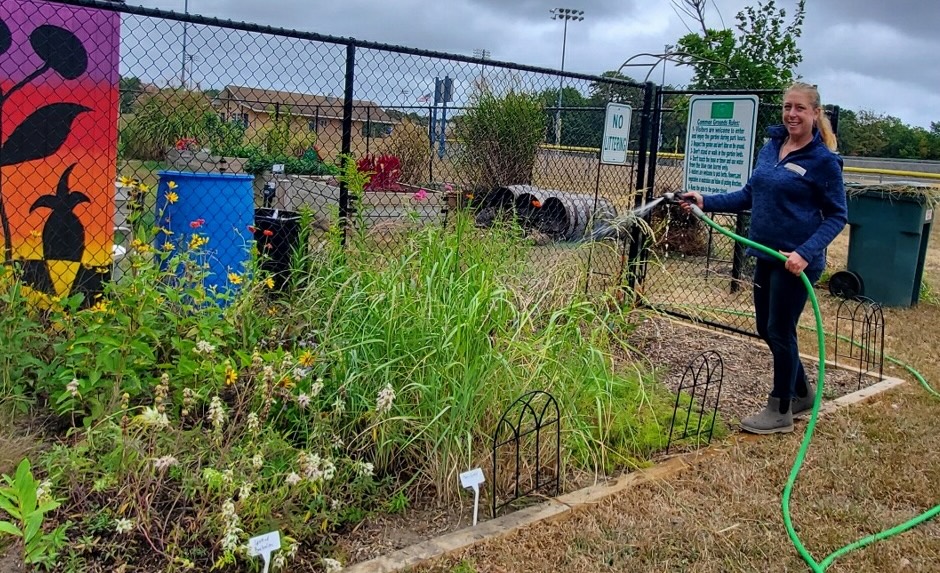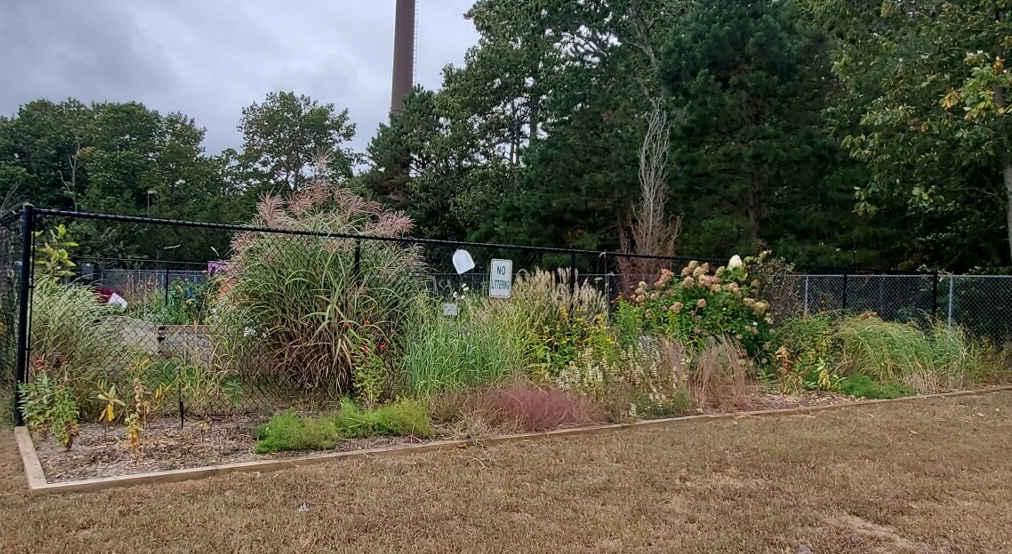Earlier this year, staff from the Ocean County Soil Conservation District (OCSCD) teamed up with our partners from the Common Grounds Community Garden to create a vibrant pollinator garden. This garden is more than just a beautiful spot—it’s a thriving ecosystem of native plants specifically chosen to attract pollinators like bees, butterflies, and other beneficial insects. These plants also play a vital role in improving soil health, thanks to their deep and complex root systems.

The pollinator garden, built using the Mid-Atlantic Habitat Kit provided by the Xerces Society, is home to an array of stunning native species, each offering unique benefits to the local environment. The carefully cultivated plants include:
- Butterfly Milkweed (Asclepias tuberosa), with its bright orange blooms, serves as a critical food source for monarch butterflies and as a host plant for their caterpillars.
- Yellow Wild Indigo (Baptisia tinctoria), a nitrogen-fixing plant that enriches the soil and supports pollinator health.
- Purple Coneflower (Echinacea purpurea), a popular perennial known for its bold purple petals that attract butterflies and bees.
- Little Bluestem (Schizachyrium scoparium), a native grass that adds structure to the garden while its roots help improve soil stability.
- Purple Lovegrass (Eragrostis spectabilis), an ornamental grass that bursts into purple-pink flowers, attracting native bees.
- Bitter Panicgrass (Panicum amarum), a hardy coastal grass that helps prevent erosion and provides cover for wildlife.
- Oxeye Sunflower (Heliopsis helianthoides), a bright yellow flower that’s a magnet for pollinators and helps support healthy soil.
- Spotted Bergamot (Monarda punctata), a fragrant herb with unique yellow-spotted blooms that attract a wide range of pollinators, especially bees.
- Narrowleaf Mountainmint (Pycnanthemum tenuifolium), known for its minty scent and its appeal to bees and butterflies.
- Seaside Goldenrod (Solidago sempervirens), a coastal species that provides essential late-season nectar for pollinators.
- Highbush Blueberry (Vaccinium corymbosum), a flowering deciduous shrub that provides a valuable nectar source for native bees in early spring and edible fruit for birds in the summer.
- Red Chokecherry (Photinia pyrifolia), a wildlife-friendly, multiple-stemmed deciduous shrub that provides berries for birds in winter.
Recently, OCSCD staff, Jessica Pinto, Erosion Control Specialist and Becky Laboy, M.Ed., Education Outreach Coordinator, returned to the garden to carry out some essential maintenance. Weeding is a key part of keeping the garden healthy and free from invasive species that might crowd out these vital native plants. By removing weeds, we ensure that these native plants can thrive, allowing them to provide habitat and food for pollinators.

In addition to supporting wildlife, the native plants in our garden play an important role in maintaining soil health. Their deep roots help break up compacted soil, increase water infiltration, and add organic matter, which improves soil structure and fertility. This contributes to erosion control and ensures that nutrients stay in the soil—an essential part of conservation efforts.
By caring for the garden and weeding regularly, we’re not only supporting pollinators but also promoting healthier, more resilient soil. Our partnership with the Common Grounds Community Garden continues to grow, and we look forward to expanding our efforts in educating the community about soil health and sustainable gardening practices.
If you’re interested in learning more about the Common Grounds Pollinator Garden or volunteering to work in the garden, please reach out. For more information about education and outreach programs through Ocean County Soil Conservation District, please contact Becky Laboy, Education Outreach Coordinator at education@soildistrict.org. Together, we can create a lasting impact on our local environment, one garden at a time.
